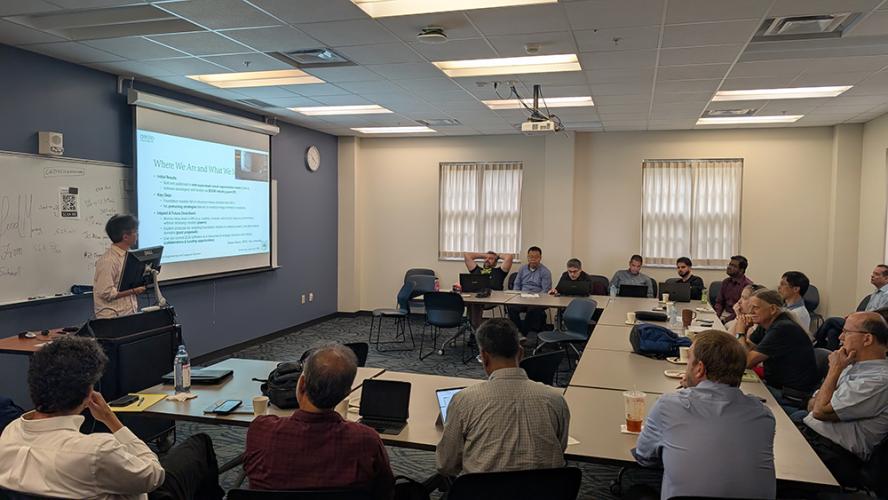
Engineering faculty drive AI innovation as Ohio University earns top quantum research honor

Ohio University has been steadily expanding its presence in artificial intelligence, and the momentum continues to grow across campus. The Russ College of Engineering and Technology launched the state’s first Bachelor of Science in Artificial Intelligence in 2024, adding new AI-focused electives in the MS in Project Management and preparing for the College of Business’s AI in Business graduate certificate arriving in Summer 2025. These programs reflect a rising industry demand for graduates who understand both the technical and human sides of AI. With this foundation in place, the college is deepening its work in AI research and collaboration.
Ohio University explores national AI trends at inaugural EECS workshop
That commitment took center stage at the first Workshop on AI in EECS (WISE), held August 20, and organized by the School of Electrical Engineering and Computer Science. The goal was simple: bring faculty together to take stock of how AI is reshaping education, research, and economic development, and map out how Russ College can lead in this fast-moving field.
The workshop opened with a shared reference point, the Stanford AI Index. Faculty talked through several clear trends: AI systems are improving quickly, and investment in the field continues to rise. Tools that were expensive even a few years ago are now cheaper and easier to access, opening the door for new research and classroom use. At the same time, big challenges remain. Schools across the country still struggle to teach AI well, public trust in AI systems needs rebuilding, and complex reasoning is an area where AI still falls short. With that context set, the conversation moved to the research happening inside EECS.
Faculty from across the school presented their work, showing how wide the spectrum of AI research has become.
Security and trust
- Ahmed Mahdad Tanvir shared how AI can use motion sensors on devices for stronger authentication.
- Ahmed Oun explained how deep learning can power practical side-channel attacks, giving researchers new insight into system vulnerabilities.
Hardware, materials, and computing
- Savas Kaya and Ismail Tirtom explored using memristors and FeFET devices for in-memory computing.
- Wojciech Jadwisienczak showed how AI and machine learning can drive autonomous material discovery.
- Faiz Rahman demonstrated AI and machine learning tools that detect defects in semiconductor wafer processing.
- Avinash Karanth outlined how silicon photonics can be used to build neural networks that move beyond traditional electrical designs.
Networking and wireless systems
- Animesh Yadav presented how deep unfolding techniques can support next-generation 5G and 6G technologies.
Human-centered and applied AI
- Trevor Bihl discussed AI plus X and the idea of cognitive exoskeletons that support human decision-making.
- Chad Mourning walked through image-based machine learning techniques for recognizing weather conditions.
- Chang Liu demonstrated how generative AI can power game-based agents.
- Xiangxu Lin explored how AI and robots can embody intelligence in educational settings.
Healthcare AI
- Zhewei Wang explained how specialized medical AI models can be scaled, using a coronary imaging project as an example.
- Ziyang Song presented new work on building trustworthy generative AI models for health applications.
After the presentations, faculty split into working groups focused on two areas: core AI, including deep learning and hardware, and applied AI, including health, cybersecurity, and robotics. These conversations centered on new collaborations, shared resources, and ways to strengthen the college’s research impact.
The second half of the workshop shifted to AI education. Led by Professor David Juedes, faculty discussed how AI teaching is changing nationwide, guided in part by insights from the recent CRA AI Summit. A panel featuring Jundong Liu, Chad Mourning, Chang Liu, and Nasseef Abukamail, moderated by Juedes, explored how to make AI education accessible to students across disciplines. Working groups then outlined ideas for new courses, certificates, and minors at both the undergraduate and graduate levels, reflecting the college’s ongoing commitment to preparing students for an AI-driven world.
Russ College team recognized for breakthrough in quantum computing and photonics
The workshop wasn’t the only AI milestone for the college this fall. Russ College also celebrated a major research achievement at IEEE Quantum Week 2025. The paper “Quantum Integrated Photonic Network-on-Chip for Manycore Architectures,” authored by Zach Takacs, Harsha Chenji, and Avinash Karanth, won the Best Paper Award in the Photonics track. Their work showed how silicon photonics can support secure quantum communication between cores inside a chip, addressing both energy efficiency and security vulnerabilities. The research introduces a new class of multicore architectures that blend secure quantum communication with high-speed photonic links, a promising direction for future chip designs.
Together, these accomplishments show the college moving with purpose: Russ College is expanding AI education, strengthening research, and building partnerships that keep pace with a rapidly evolving field. With programs that prepare students for emerging careers and faculty pushing the boundaries of what AI and quantum technology can do, the college is shaping the next chapter of innovation at Ohio University and in the world.
